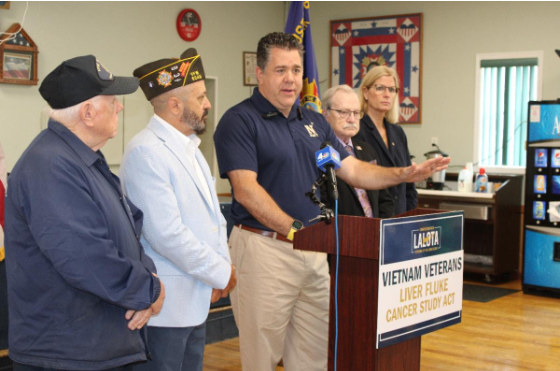
U.S. Representative Nick LaLota (R-Rocky Point) joined local elected officials and Vietnam veterans in calling on the U.S. Veterans Administration (VA) to expand VA care and support for Vietnam Veterans suffering from bile duct cancer linked to their military service.
In 2018, the Northport Veterans Affairs Medical Center in New York conducted a groundbreaking study on liver fluke infection among Vietnam Veterans, using a 50-veteran sample size. Although the study was smaller than most, its findings highlighted an urgent need for a larger-scale investigation, the development of standardized treatment protocols and expanded access to care for affected veterans at VA facilities nationwide.
LaLota, a Navy veteran and member of the Military Construction & Veterans Affairs Appropriations Subcommittee, presented The Liver Fluke Cancer Study Act during the 118th Congress, which required the VA to conduct a comprehensive study on the prevalence of liver fluke infections among Vietnam Veterans. It passed the House in September 2024, but The Senate failed to act.
Gerald Wiggins, a Vietnam veteran and Suffolk County resident, came to LaLota pleading for him to push the bill further. LaLota said he continued to fight for the bill and it was passed on April 7 by the House unanimously, with a vote of 411-0.
“The facts are clear: Vietnam War veterans who served in-theater are 30% more likely to develop bile duct cancer than those who served elsewhere, yet the VA still refuses to acknowledge the connection,” said LaLota. “The VA could fix this with the stroke of a pen. They don’t need another study. But if that’s what it takes, we’ll keep pushing until this bill becomes law and the VA finally does right by our Vietnam Veterans.”
“There are 800,000 Veterans in New York State. There are 134,000 Veterans on Long Island. If you push this bill through, you’re a hero,” said Wiggins. “Can someone explain to me in the Senate now why you can’t pass this bill? If 800,000 veterans come together in Washington, D.C., like they did in the 60s and 70s, maybe something will go through.”

